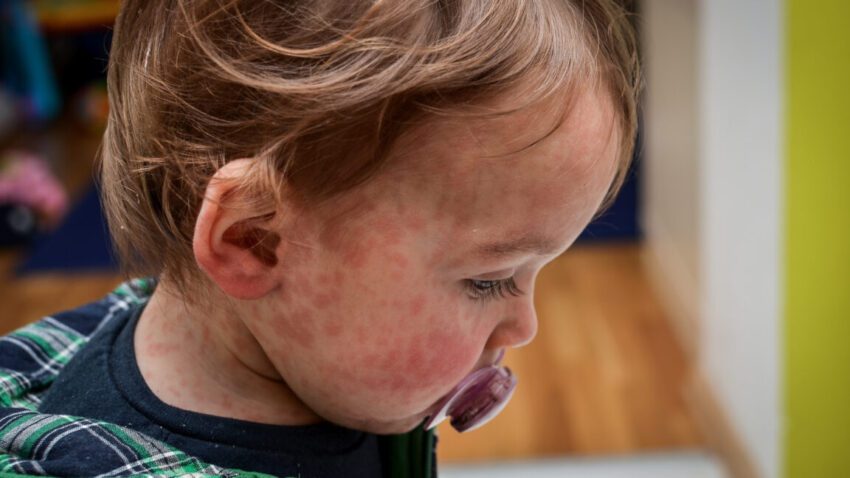
child dies of horrifying measles complication in A tragic incident in Los Angeles highlights the severe consequences of measles, as a child has died from a rare but fatal complication associated with the disease.
child dies of horrifying measles complication in
Overview of the Incident
On Thursday, the Los Angeles County health department reported the death of a child due to subacute sclerosing panencephalitis (SSPE), a devastating neurological disorder that can develop years after an initial measles infection. This case serves as a stark reminder of the dangers posed by measles, particularly for vulnerable populations, including infants who are not yet eligible for vaccination.
Understanding Subacute Sclerosing Panencephalitis (SSPE)
SSPE is a rare but serious complication that can occur in individuals who have had measles, typically manifesting seven to ten years after the initial infection. The disorder is characterized by progressive neurological decline, leading to severe cognitive impairment, seizures, and ultimately death. The condition affects approximately one in 4,000 cases of measles, making it an extremely rare outcome but one that underscores the potential long-term consequences of the disease.
The pathophysiology of SSPE involves the persistent infection of the brain by the measles virus, which can remain dormant for years before causing symptoms. The exact mechanisms by which the virus leads to neurological damage are not fully understood, but it is clear that the risk of developing SSPE is significantly higher in individuals who contract measles at a young age, particularly before the age of one.
Vaccination and Measles
The measles, mumps, and rubella (MMR) vaccine is the primary method of preventing measles and its complications. The Centers for Disease Control and Prevention (CDC) recommends that children receive the first dose of the MMR vaccine between 12 and 15 months of age, followed by a second dose between 4 and 6 years. Vaccination not only protects the individual but also contributes to herd immunity, which is crucial for safeguarding those who cannot be vaccinated, such as infants and individuals with certain medical conditions.
In the case reported by the Los Angeles County health department, the child contracted measles before reaching the age of vaccination, highlighting the importance of community immunity. Muntu Davis, a health officer in Los Angeles County, emphasized this point in a statement, noting that “infants too young to be vaccinated rely on all of us to help protect them through community immunity.” This statement reflects the collective responsibility of the community to ensure high vaccination rates to protect the most vulnerable members.
The Importance of Community Immunity
Community immunity, or herd immunity, occurs when a significant portion of a population becomes immune to a disease, thereby reducing its spread. This phenomenon is particularly important for diseases like measles, which are highly contagious and can lead to severe complications. The threshold for achieving herd immunity for measles is estimated to be around 95%, meaning that at least 95% of the population must be vaccinated to effectively prevent outbreaks.
Recent years have seen a decline in vaccination rates in certain areas, leading to an increase in measles cases and outbreaks. Factors contributing to this decline include vaccine hesitancy, misinformation about vaccine safety, and access issues. The consequences of lower vaccination rates can be dire, as evidenced by the resurgence of measles in various parts of the world, including the United States.
Historical Context of Measles in the U.S.
Measles was declared eliminated in the United States in 2000, thanks to widespread vaccination efforts. However, the disease has made a comeback in recent years, with significant outbreaks occurring in 2019 and 2020. These outbreaks were largely attributed to unvaccinated populations, often in communities with low vaccination rates. The resurgence of measles serves as a cautionary tale about the importance of maintaining high vaccination coverage to prevent the return of diseases that were once under control.
Public Health Response
The Los Angeles County health department’s announcement of the child’s death serves as a call to action for public health officials and the community at large. Health authorities are likely to increase efforts to educate the public about the importance of vaccination and the risks associated with measles. Campaigns aimed at dispelling myths about vaccine safety and efficacy are essential to combat vaccine hesitancy and encourage families to vaccinate their children.
In addition to educational efforts, public health officials may also consider implementing policies to increase vaccination rates, such as requiring vaccinations for school attendance or providing incentives for families to vaccinate their children. These measures can help ensure that communities achieve and maintain the high vaccination rates necessary for herd immunity.
Stakeholder Reactions
The death of the child has elicited a range of reactions from various stakeholders, including public health officials, medical professionals, and community members. Many have expressed their condolences to the family while emphasizing the importance of vaccination in preventing such tragedies.
Dr. Muntu Davis’s statement reflects the sentiments of many in the public health community, as he noted that this case serves as a painful reminder of the dangers of measles. His call for community responsibility in protecting vulnerable populations resonates with health officials across the country, who are increasingly concerned about the implications of declining vaccination rates.
Parents and caregivers are also expressing concern about the safety of their children and the potential risks associated with measles. The emotional weight of such a loss can lead to increased anxiety among families, particularly those with infants who are not yet eligible for vaccination. Public health campaigns must address these concerns while providing clear, evidence-based information about the benefits of vaccination.
Looking Ahead
The tragic death of the child in Los Angeles serves as a critical reminder of the ongoing challenges in public health regarding vaccine-preventable diseases. As communities grapple with vaccine hesitancy and misinformation, it is essential to reinforce the importance of vaccination as a means of protecting not only individual health but also the health of the community as a whole.
In the wake of this incident, it is crucial for public health officials, medical professionals, and community leaders to collaborate on strategies to improve vaccination rates and educate the public about the risks associated with measles and other vaccine-preventable diseases. By fostering a culture of vaccination and community responsibility, it is possible to prevent future tragedies and protect the most vulnerable members of society.
Conclusion
The death of a child from a measles-related complication in Los Angeles underscores the critical importance of vaccination and community immunity. As public health officials work to address declining vaccination rates and combat misinformation, the collective responsibility of the community becomes increasingly vital. Protecting the health of our most vulnerable members, especially infants who cannot yet be vaccinated, requires a united effort to ensure that vaccination remains a priority for all.
Source: Original report
Was this helpful?
Last Modified: September 12, 2025 at 4:36 am
0 views















